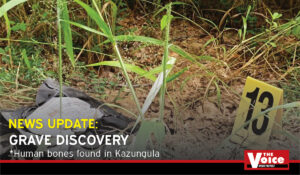Shortage of medicine puts patients’ lives at risk
Shortages of drugs, which started to be noticeably bad in public hospitals last year, has worsened over time, putting the lives of chronic disease patients across the country at risk.
Speaking in an interview with The Voice this week, the Ministry of Health Chief Public Relations Officer, Dr Christopher Nyanga, has highlighted wider problems associated with complex global supply chains as one of the major causes of shortages of medicines, especially for chronic diseases.
He also noted that the ministry often experiences delays in arrival for procured medications mainly due to the high demand for medical supplies globally, which has increased drastically and has outstripped supply.
“The situation is further aggravated by the fact that most of these medications are manufactured outside the country, which has resulted in most manufacturers having to satisfy their local markets before supplying external clients, but the ministry is working round the clock to expedite the procurement process to avoid long delays that are associated with normal procurement processes,” said Nyanga.
He further explained that to address the situation, the Ministry of Health has devised some short-term interventions to buy locally-available medications from the private sector through micro procurement.
However, this approach is proving too expensive, as most suppliers would inflate their pricing.
Asked if the recent deaths of babies from the outbreak of diarrhoea were linked to a shortage of Rotavirus vaccine, Dr Nyanga said the vaccine was not one of the medicine supplies which were in short supply.
“The vaccine is readily available at District Health Management Team. However, there was an outbreak of diarrhoea across the country in recent months and since the beginning of October 2022, the situation has been improving with weekly cases going down,” he said.
According to Nyanga, some diahroea related deaths have been recently reported, especially for children aged below five years old but he could not provide the actual numbers of the deaths because statistics was still being audited to determine if indeed it was diarrhoea that caused the deaths or something else and, only after that process has been concluded, can the ministry then give an accurate figure,’ he added.
Meanwhile, the ministry has strengthened case management systems to ensure quality clinical management of all diarrhoea cases.
“The ministry has strengthened community mobilisation and public education to increase awareness and sensitisation on diarrhoea and prevention measures as well as continue to monitor the quality of food and water used across the country,” Nyanga said.




















